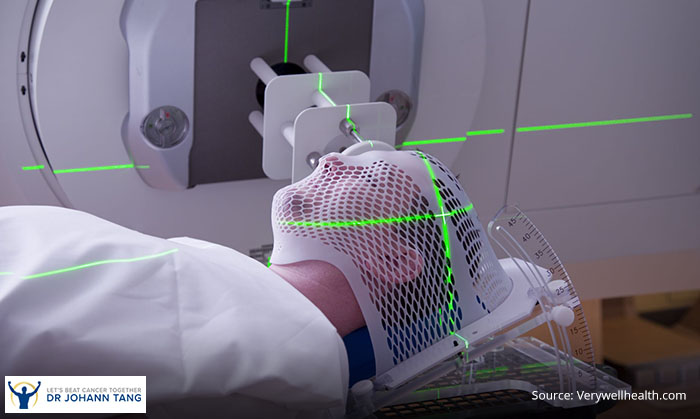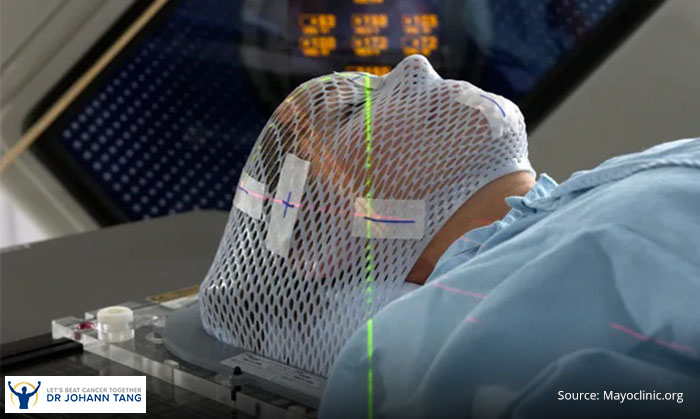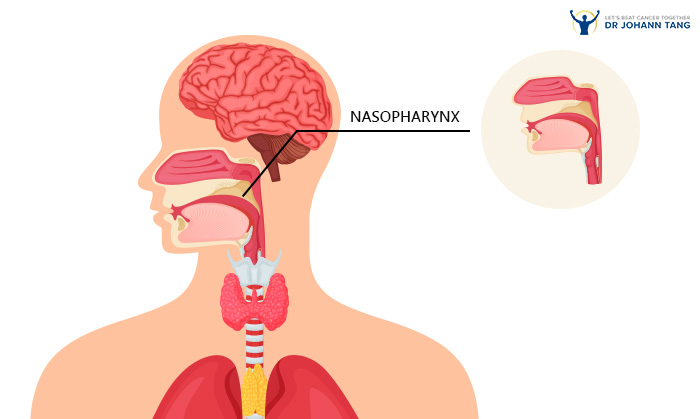Comparing Between Stereotactic Radiosurgery & Radiotherapy
Medically reviewed by Dr Johann Tang, Senior Consultant Radiation Oncologist

Stereotactic radiosurgery (SRS) and Stereotactic radiotherapy (SBRT) are highly effective in treating specific types of tumours. Learn more about stereotactic-based treatment as well as the differences between these two radiation treatment methods.
What is stereotactic treatment?
Stereotactic treatments such as stereotactic radiosurgery or stereotactic body radiotherapy (sbrt) are different radiation treatment modalities that utilise specialised equipment to position the patient and deliver a precise dose of radiation to destroy tumour cells. Compared to conventional forms of EBRT, stereotactic treatments utilise a precise targeting and delivery approach to locate tumour cells which are often located deep within a patient’s body. From there, radiation oncologists are able to precisely calculate and control the optimal radiation dose, compensating for minor respiratory motion, with help from sophisticated software.
Stereotactic treatments offer numerous advantages to patients. These include using non invasive radiotherapy treatments instead of surgery, reduced treatment sessions, lesser damage to healthy surrounding tissues, fewer and milder side effects compared to standard conventional EBRT. They can also be used to treat non-cancerous conditions as well, making them a valued treatment tool.
How do stereotactic radiotherapy and Stereotactic radiosurgery differ?
SBRT radiotherapy is usually used to treat small localised tumor in the body. A key advantage of this treatment method is that it allows for large doses of radiation to be delivered in a few sessions (usually 3 to 5 sessions) and each session can range from 10 to 20 minutes in duration. This means that patients can enjoy a shortened overall treatment timeline compared to conventional radiotherapy, allowing them to return to normal life swiftly.
Stereotactic radiosurgery, or SRS, also utilises highly precise beams of radiation to treat small and localised tumours in the brain. SRS is frequently completed within a single outpatient treatment session, while SBRT radiotherapy is across a few sessions.
SRS can also be used to treat non-cancerous conditions, such as meningioma, trigeminal neuralgia, and arteriovenous malformations.
Stereotactic radiosurgery comes in two modalities: Framed and Frameless. Framed SRS is usually used on Gamma Knife machines, and is a minimally-invasive procedure which involves the securing of a metal headframe onto the patient’s skull using screws. Frameless SRS is a newer non invasive option normally used on LINAC based machines. It does not involve any screws, instead uses a thermoplastic mask to secure the patient’s head position. The major advantage of frameless is that it provides the same accuracy and efficacy of treatment, while avoiding any invasive procedures to the patient skull. This provides greater comfort while still providing the same effective treatment for patients.
Looking for a reputable clinic for either SBRT radiotherapy or stereotactic radiosurgery? Get in touch with us today to arrange for an appointment and treatment.

Related Articles
Read this next ...

Dr Johann Tang
Senior Consultant Radiation Oncologist
Medical Director of ME Novena Specialist Group Pte Ltd
MBBS (Aust), FRANZCR (Radiation Oncology)
Dr Johann Tang is the Senior Consultant and Medical Director of ME Novena Specialist Group Pte Ltd. at Mount Elizabeth Novena Hospital and an Assistant Professor at the Yong Loo Lin School of Medicine, National University Singapore. Dr Tang’s journey towards being a radiation oncologist in Singapore started with him obtaining his medical degree from the University of Newcastle, Australia, in 1998 and completing his house officer training at the Hunter Area Health Service before returning to Singapore to complete his National Service in the Singapore Armed Forces Medical Corps. Thereafter, he did his specialty training in Radiation Oncology in Singapore at the National University Hospital (NUH). After obtaining his fellowship from the Royal Australian College of Radiologists (FRANZCR) in 2007, Dr Tang underwent breast brachytherapy fellowships at the University of Wisconsin as well as prostate brachytherapy, skin, and paediatric fellowships at the Peter Maccallum Cancer Institute, Australia. In 2021, Dr Tang underwent a fellowship at the New York Proton Centre with Dr Charles Simone in head and neck, re-irradiation, paediatric, prostate, and lung cancers.
Why Choose Dr Johann Tang
Dr Johann Tang is an experienced radiation oncologist and cancer doctor who aims to deliver the highest level of care to his patients, especially when it comes to radiation therapy and cancer treatment. As a cancer specialist in Singapore, he is dedicated to understanding each patient’s condition and providing holistic, customised care that is both effective and compassionate. With ethics and empathy at the core of our practice, we strive to understand your individual needs and provide care that is compassionate and responsive.
"I guarantee my very best expertise delivered with compassion and dignity as we journey TOGETHER to BEAT this dreaded illness."
Make An Enquiry
Got Queries? Book an appointment with Dr Johann Tang by filling up this form. We'll get on a call with you as soon as possible.
Prefer to talk? Call us directly at +65 6690 6811
or email us at drjohanntang@gmail.com





